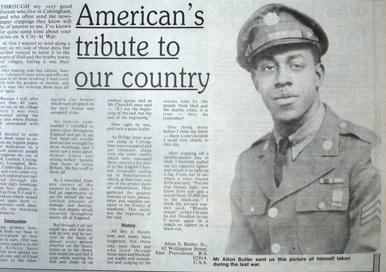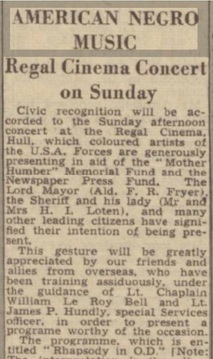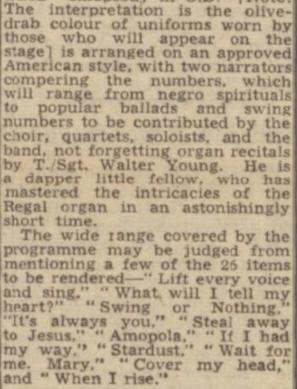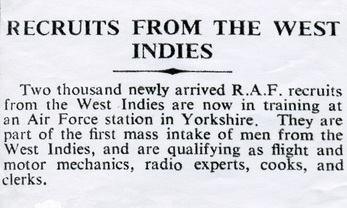During WWII, Black servicemen of African descent from both America and the West Indies arrived in Hull and East Yorkshire and were billeted at bases such as RAF Hunmanby Moor and the U.S. Army camp at Harland Road, Cottingham. Below are newspaper clippings, both contemporary and modern, which provide some historical insight and detail.
If you feel you can add any more information about any of these servicemen/women or have any stories or memories or could provide more details then please contact us HERE.
If you feel you can add any more information about any of these servicemen/women or have any stories or memories or could provide more details then please contact us HERE.
Hull Daily Mail, 9 April 1990, p9
|
click for newspaper Transcription
Transcription Brave Britain! An American’s tribute to our country Through my very good friends who live in Cottingham, and who often send me newspaper clippings they know will be of interest to me, I’ve known for quite some time about your series on A City At War. At first I wanted to send along a story on my side of those days, but decided instead to leave it to the people of Hull and the nearby towns and villages feeling it was their story. After reading your last edition, however, I decided I must write and offer my praise to all those involved. I read every story with the greatest of interest, and felt it was like re-living those days all over again. Because I still, after more than 40 years have ties to the village where I was once stationed during the war and where friends still correspond to me. I decided to write this short letter to express my highest praise and dedication to a much admired people throughout the city of Hull, London, Cottingham, Liverpool, Bristol, Cambridge, Coventry and every other city which endured and suffered through the almost daily bombings from Axis’ planes as well as V-1 and V-2 rockets which rained down upon them—sometimes with absolutely no warning whatsoever. Destruction Our primary function from our base in Cottingham at that time in early 1943 was to carry supplies to the 8th Airforce bases which were spread out from one end of Great Britain to the other, mainly the bombs which were dropped on the Axis’ Forces and occupied cities. As convoy commander I travelled to many cities throughout England and got to see first hand the terrible destruction wrought by these bombings and I never saw a more determined, brave and strong-willed people than those of Great Britain. My hat is off to them all. As I travelled from one corner of the country to the other I had an opportunity to see for myself the unlimited amount of damage and destruction and deaths which occurred throughout nearly all of England. But through it all one could see and feel the will to win and to survive in the faces of almost every person whether on the buses, trains or in the shops; one could see and feel it even while waiting for fish and chips in an endless queue, and as Mr Churchill once said—“It’s not the beginning of the end, but the end of the beginning.” How right he was, and such a great leader. As D-Day drew near our camp at Cottingham was evacuated and our company, along with the other outfits which were stationed there, moved a bit closer to the English Channel, eventually ending up in Southampton which, at that time, was one of the greater ports of embarkation. Here gathered the greatest armada of men, planes, ships and supplies unequal in the history of mankind. This surely was the beginning of the end. History All this is history now and many have forgotten, but those who were there and who lived through those days and blacked-out nights will remember and judging by the stories told by the people of Hull and the nearby cities, it is true—they do remember! One thing more before I close my letter—there is one incident I recall very clearly to this day. After stepping off a double-decker bus in Hull, I foolishly pulled out my cigarette lighter and struck it to light up a fag. From out of nowhere a voice blasted forth and said: “Put out that bloody light, you know Jerry can spot a match from 20,000 feet in the black-out.” I think the air-raid warden said: “Bloody match”, in fact I’m sure he did. Needless to say I never again lit a match or lighter in a black-out. Alton S. Butler, Sr., 42 Wellington Street East Providence, R.S. 02914 USA [picture caption: Mr Alton Butler sent us this picture of himself taken during the last war.] |
Hull Daily Mail 23 February 1944, p3
|
click for newspaper transcription
Transcription American Negro Music Regal Cinema Concert on Sunday Civic recognition will be accorded to the Sunday afternoon concert at the Regal Cinema, Hull, which coloured artists of the USA Forces are generously presenting in aid of the "Mother Humber" Memorial Fund and the Newspaper Press Fund. The Lord Mayor (Ald. F. R. Fryer) the Sheriff and his lady (Mr and Mrs H. I. Loten), and many other leading citizens have signified their intention of being present. This gesture will be greatly appreciated by our friends and allies from overseas, who have been training assiduously under the guidance of Lt. Chaplain William Le Roy Bell and Lt. James P. Hundly, special services officer, in order to present a programme worthy of the occasion. The programme, which is entitled "Rhapsody in O.D." [Note: The interpretation is the olive drab colour of uniforms worn by those who will appear on the stage] is arranged on an approved American style, with two narrators compering the numbers, which will range from negro spirituals to popular ballads and swing numbers to be contributed by the choir, quartets, soloists and the band, not forgetting organ recitals by T/Sgt. Walter Young. He is a dapper little fellow, who has mastered the intricacies of the Regal organ in an astonishingly short time. The wide range covered by the programme may be judged from mentioning a few of the 25 items to be rendered:-- "Lift ever voice and sing," "What will I tell my heart?" "Swing or nothing," "It's always you," "Steal away to Jesus," "Ampola," "If I had my way," "Stardust," "Wait for me, Mary," "Cover my head," and "When I rise." |
Filey & Hunmanby Mercury, 25 June, 1994
June 1944, West Indian airmen with the congregation at Reighton Chapel. [courtesy of Audrey Dewjee]
The Times, 11 July 1944, p2.
|
Transcription
Recruits from the West Indies Two thousand newly arrived RAF recruits from the West Indies are now in training at an Air Force station in Yorkshire. They are part of the first mass intake of men from the West Indies, and are qualifying as flight and motor mechanics, radio experts, cooks, and clerks. |




